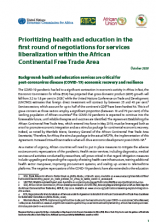Prioritizing health and education in the first round of negotiations for services liberalization within the African Continental Free Trade Area

The COVID-19 pandemic has led to a significant contraction in economic activity in Africa. In fact, the Economic Commission for Africa (ECA) has projected that gross domestic product (GDP) growth will fall from 3.2 to 1.8 per cent in 2020,1 while the United Nations Conference on Trade and Development (UNCTAD) estimates that foreign direct investment will contract by between 25 and 40 per cent.2 Services sectors, which account for up to half of the continent’s GDP,3 have been hardest hit. This is of grave concern as those sectors employ a significant proportion (between 10 and 70 per cent) of the working population of African countries.4 The COVID-19 pandemic is expected to continue into the foreseeable future, until reliable therapies and vaccines are identified. The Agreement Establishing the African Continental Free Trade Area, which entered into force in May 2019, must be leveraged both as a tool to promote economic integration and as a stimulus package for continental economic recovery. Indeed, as noted by Wamkele Mene, Secretary General of the African Continental Free Trade Area Secretariat, “Therefore, for Africa, the stimulus package is the actual AfCFTA, the implementation of this Agreement. Increased intra-African trade is what will drive economic development post-COVID-19”.